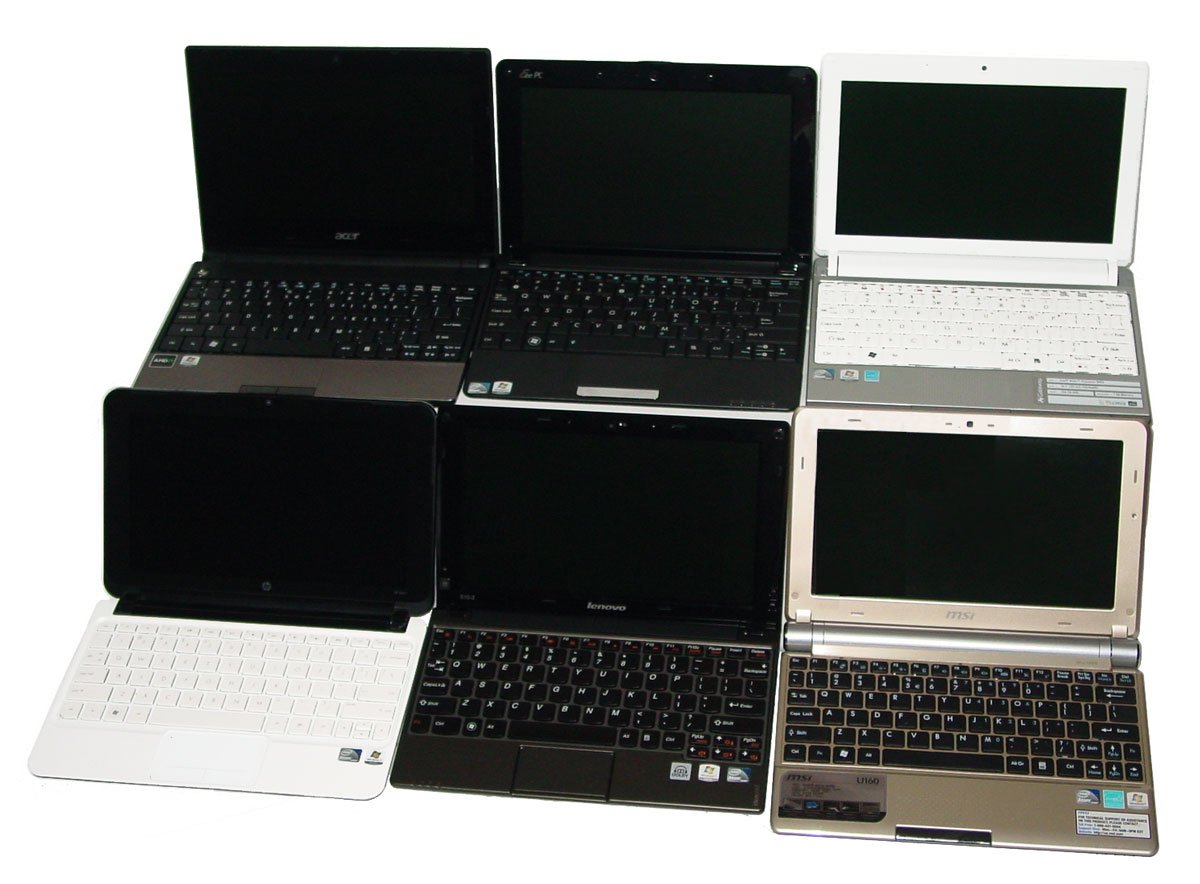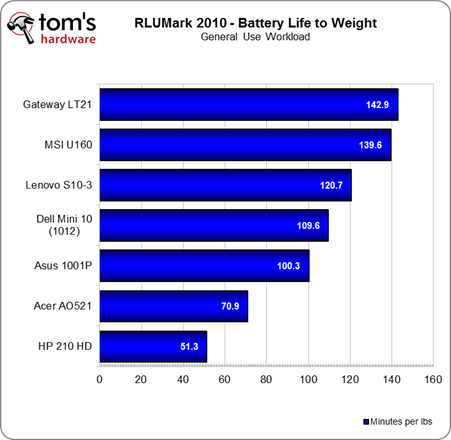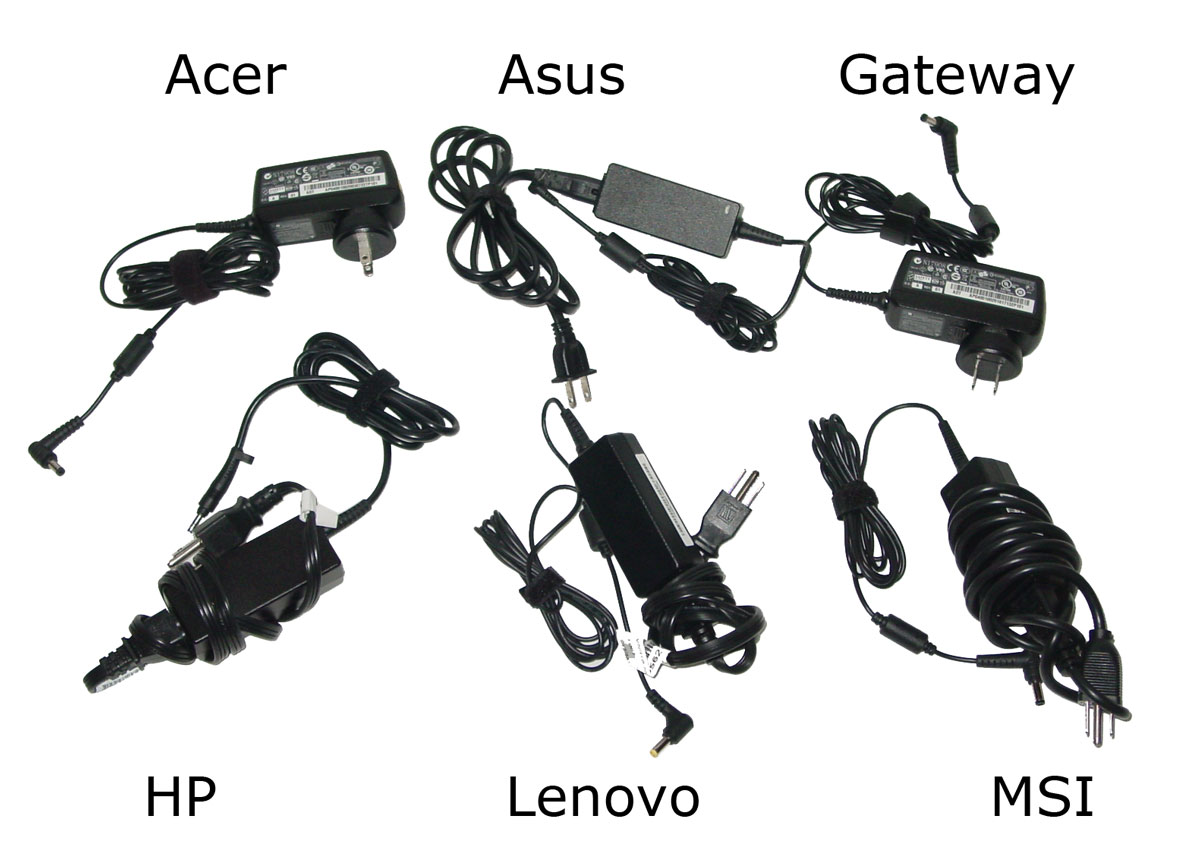Tom's Definitive 10.1" Netbook Buyer's Guide: Fall 2010
Weight Profile
| Brand | Acer | Asus | Dell | Gateway | HP | Lenovo | MSI |
|---|---|---|---|---|---|---|---|
| Model | AO521 | 1001P | 10 (1012) | LT2120u | 210 HD | S10-3 | U160 |
| Weight w/ Battery (lbs) | 2.79 | 2.82 | 3.10 | 2.67 | 2.61 | 2.58 | 2.72 |
| Battery Weight (lbs) | 0.665 | 0.69 | 0.725 | 0.675 | 0.37 | 0.655 | 0.69 |
| Ac Adapter Weight (lbs) | 0.41 | 0.54 | 0.42 | 0.41 | 0.62 | 0.54 | 0.63 |
| Adapter Output | 40 | 40 | 30 | 40 | 40 | 40 | 30 |
The Lenovo S10-3 is the lightest of the bunch, but every notebook here is under 3 lbs. With these netbooks, we are talking about ounces of difference.
Pound for pound, you will see higher battery life with the Gateway LT2120u and MSI U160 netbooks simply because they use higher-density batteries (2.9 Ah cells).
People don’t usually consider adapter profiles. With netbooks, we are looking at small power bricks. This makes cord management somewhat ugly, as you can see. The two standouts here are Acer and Gateway. They operate under one parent company (Acer Global), but they still have separate notebook design teams. Power bricks don’t factor into design, so it isn’t surprising to see identical power bricks across the two brands. What I like is the simple cord management. The AC plug is actually a separate module that locks in at 90° or 180°, which means that it shouldn’t obstruct the use of other appliances.
Current page: Weight Profile
Prev Page Benchmark Results: Gaming And Multimedia Next Page Broadcom Crystal HD: Not Such Crystal Clear PerformanceGet Tom's Hardware's best news and in-depth reviews, straight to your inbox.
-
frederico Very indepth excellent review. Pleasantly surprised. A lot of people out there have little clue of netbooks or even their uses. I got a little samsung last year and now I use it more than my main PC, obviously not for gaming, but watching webcasts/films at night, listening to music, grabbing it while watching TV to check something on the web, etc, etc. Not to mention completely essential when travelling on train/bus/wherever - 6 hours batt life still holding up.Reply
Very handy little things - easy to become addicted to. Theres some new models coming out this month that can handle HD but still have great batt life, will be tempted to pick one up.
-
ScoobyJooby-Jew I have used a Gateway netbook with vista and 2 gigs of ram. I loved it. The 2 gigs really helped smooth things out. And when I loaded the netbook distro of ubuntu, it was ridiculously awesome. It satisfied everything except gaming. Which is what I wanted it to do.Reply -
Luscious That's the best performance rundown I've seen to date on the Broadcom Crystal HD - nice to get critical, hands-on info without the marketing BS. That said, AMD's Nile platform is seriously spanking Intel.Reply
I recently tested the HP Pavilion dm1z with the dual-core K625. Only slightly heavier/bigger than the 10" HP 210 Mini, but far superior when it comes to performance:
http://lgponthemove.blogspot.com/2010/09/first-impressions-hp-dm1z-notebook.html -
lashabane Huh, never knew that a full propane tank weighs ~38 lbs.Reply
*Ninja edit*
Super good roundup/review. I'm in the market for a netbook this season and this review helped a lot. -
braneman I actually found that on my last netbook (toshiba satalite, amd based) with a ram upgrade the only game it couldn't play passably on lowest settings(resolution included) was red faction guerrilla, even then it was graphical errors, you could even bring Crysis up to MEDIUM on some settings. meh now I got an m11x, it's very nice.Reply -
KingArcher OMG this review is like drugs for the technically inclined.Reply
Good....no, Excellent job Andrew Ku. Amazing stuff. Really learned something new.
I look forward to reading more reviews from you. :bounce:
P.S. Editors, give this man a raise ;) -
super_tycoon If you're doing a 12 inch in the near future, I hope you include the Asus 1215n. I've had mine for three weeks and it's brilliant. ION2 and Optimus are easily worth whatever I paid for them. Playing any HD youtube video yields unicorns and butterflies while my friend's gateway (the one reviewed here) only gets the look of disapproval.Reply
My concern is that drivers for ION2 are a bit -fast- slow and loose now, the stock asus drivers were crap, the Nvidia update at launch was crap, but about two weeks ago there was a major update that requires manual installation. It gets roughly double, yes double, the fps of the old pos. Now I didn't write the thing, but it felt like it addressed the PCI-Ex1 link narrowness. (After all, what else could it be? It's just a 210m at it's core, but whatever's drawn on the Nvidia gpu also has to go back down the PCI-E link to be written to the Intel gpu vram (Optimus))
Anyhow, forget the broadcom thing, my friend (a different one, I promise they're real and actually have these things!) has the dell and it's pretty bad. Even I couldn't get that stupid thing to work reliably except for WMP. At least he got his with his new xps 16.
TL;DR I've actually used the gateway and dell netbooks reviewed here and they're both crappy. The gateway gets good battery life though and feels nicer. I love the asus 1215n with it's ION2 gpu and Optimus, and you should too.


